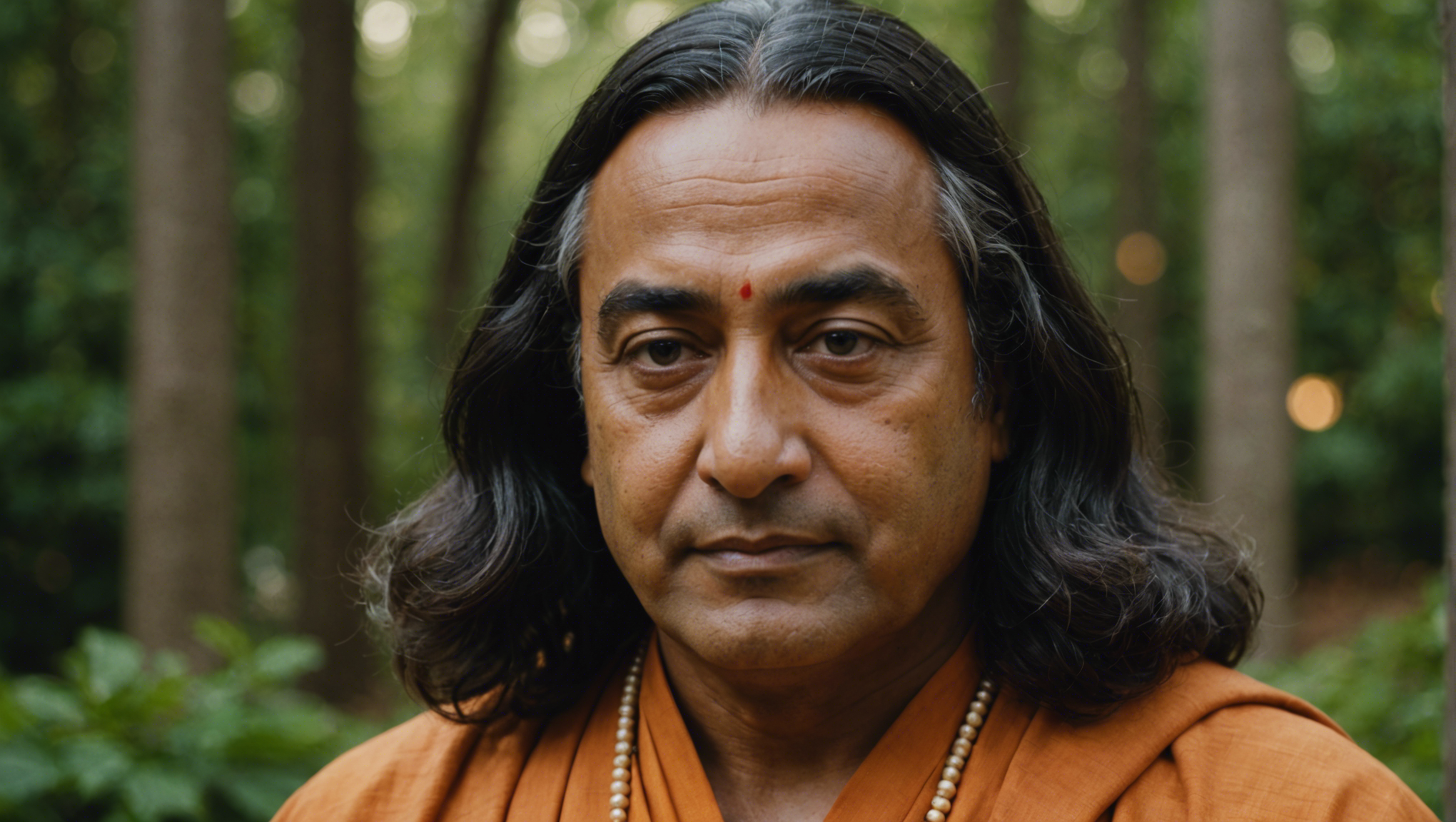Understanding Paramahansa Yogananda: A Spiritual Leader’s Journey
The Life and Teachings of Paramahansa Yogananda: A Glimpse into the Journey of a Spiritual Leader
The remarkable journey of Paramahansa Yogananda transcends mere biography, weaving together the rich tapestry of spiritual awakening, timeless wisdom, and the quest for self-realization. Yogananda’s life story is not just a chronicle of his achievements but a beacon of light for seekers of truth across generations. His teachings, deeply rooted in the ancient spiritual traditions of India, were tailored for the modern world, offering a path to inner peace and harmony with the universal divine.
Early Life and Spiritual Calling
Born in India in 1893, Yogananda’s early life was marked by a profound sense of spiritual longing. From his youthful quest for enlightenment to his encounter with his guru, Sri Yukteswar Giri, Yogananda’s formative years were a testament to his unwavering resolve to fathom life’s deepest truths. It was under the guidance of Sri Yukteswar that Yogananda’s spiritual vision was nurtured, preparing him for the monumental task that lay ahead – spreading the teachings of Kriya Yoga to the West.
Embarking on a Spiritual Mission
Yogananda’s arrival in America in 1920 marked the beginning of a new chapter in the annals of spiritual dissemination. His landmark speech at the International Congress of Religious Liberals in Boston introduced the Western world to the ancient practices of Yoga and meditation, which until then, were shrouded in mystery beyond the Indian subcontinent. This momentous event set the stage for the establishment of the Self-Realization Fellowship (SRF), an organization dedicated to the spiritual upliftment of humanity.
Kriya Yoga: Reviving Ancient Wisdom
The essence of Yogananda’s teachings centered around Kriya Yoga, a scientific technique of meditation aimed at accelerating spiritual growth and attaining direct personal experience of God. Through his writings and lectures, Yogananda elucidated the underlying unity of the world’s great religions, emphasizing the universal pursuit of divine communion. Kriya Yoga became the cornerstone of his mission, embodying a practical approach to spirituality that was both accessible and transformative.
Literary Contributions and Lasting Legacy
Paramahansa Yogananda’s literary opus, "Autobiography of a Yogi", is a spiritual classic that has inspired millions worldwide. Published in 1946, this memoir offers an enthralling account of his life’s journey, profound insights into the nature of reality, and encounters with spiritual luminaries. The book remains a seminal work in the spiritual literature, continuing to attract people to the path of self-realization.
Beyond his written work, Yogananda’s legacy is enshrined in the continuing efforts of the SRF to propagate his teachings. Through meditation centers, retreats, and various publications, the spirit of Yogananda’s message lives on, guiding individuals toward inner peace and fulfillment.
Integrating Spirituality and Daily Life
One of Yogananda’s pivotal teachings was the integration of spiritual practice with everyday life. He advocated for a balanced approach that does not shun worldly responsibilities but rather, engages with them more consciously. Yogananda demonstrated how meditation and the principles of yoga could be woven into the fabric of one’s daily routine, leading to greater harmony, productivity, and happiness.
As we reflect on the life and teachings of Paramahansa Yogananda, it becomes clear that his journey was not just about the milestones he achieved but about the countless souls he touched and transformed. His message of love, unity, and self-discovery continues to resonate, offering a timeless guide for all who seek to tread the path of spiritual awakening. In a world fraught with turmoil and division, Yogananda’s vision of a spiritually awakened humanity is as relevant today as it was during his time.
The journey of Paramahansa Yogananda is a testament to the enduring power of spiritual truth and its capacity to transcend cultural and temporal boundaries. By embodying his teachings, we can embark on our quest for self-realization, contributing to a world that reflects the divine unity at the heart of Yogananda’s enduring message.
Kriya Yoga: The Core Practice Advocated by Yogananda for Attaining Self-Realization
Paramahansa Yogananda, a spiritual luminary of the 20th century, introduced the sacred technique of Kriya Yoga to the West, encapsulating a profound method for attaining self-realization and direct communion with the divine. His teachings, immortalized in the timeless classic Autobiography of a Yogi, serve as a spiritual beacon for millions of seekers worldwide, guiding them on a path of inner awakening.
The Essence of Kriya Yoga
At the heart of Yogananda’s spiritual doctrine lies Kriya Yoga, an ancient meditation practice aimed at accelerating spiritual growth and fostering a deeper understanding of the self and the universe. This technique is predicated on the belief that each individual is a microcosm of the cosmos, and through the purification of the body and mind, one can attain union with the omnipresent spirit.
The Scientific Approach to Spirituality
Yogananda was a pioneer in presenting spirituality and meditation from a scientific perspective, illustrating how Kriya Yoga aligns with the laws of nature and psychology. He elucidated how this practice can effect transformation at the cellular level, reorienting the body’s energy and consciousness towards higher realms of existence.
The Role of the Guru-Disciple Relationship
Paramahansa Yogananda emphasized the importance of the guru-disciple relationship in the spiritual journey, viewing it as essential for receiving the teachings and initiation into Kriya Yoga. This sacred bond is seen as a conduit of spiritual energy and wisdom, enabling the disciple to navigate the path to enlightenment with the guru’s guidance and grace.
Integrating Practice into Daily Life
Yogananda advocated for the integration of spiritual practices into daily life, encouraging his disciples to live with intention, balance, and harmony. Kriya Yoga, with its focus on breath control and meditation, offers a practical toolkit for cultivating peace, resilience, and spiritual insight amidst the challenges of modern living.
Beyond Personal Transformation
While Kriya Yoga serves as a powerful tool for personal transformation, Yogananda also viewed it as a means to achieve global harmony and unity. By elevating consciousness and promoting universal love, this practice has the potential to transcend barriers of culture, religion, and ideology, fostering a more compassionate and understanding world.
Embracing the Path of Kriya Yoga
For those drawn to the teachings of Paramahansa Yogananda, embracing Kriya Yoga involves a commitment to disciplined practice, ethical living, and a quest for deeper spiritual truth. This path is not merely about achieving fleeting states of bliss but about realizing one’s eternal nature and contributing to the upliftment of humanity.
Legacy and Continuing Influence
Today, the legacy of Paramahansa Yogananda and Kriya Yoga continues to inspire a new generation of spiritual seekers. Through the work of organizations like Self-Realization Fellowship and Yogoda Satsanga Society of India, established by Yogananda, the timeless teachings of Kriya Yoga are made accessible to all who yearn for spiritual awakening and a life of purpose.
The journey of Kriya Yoga, as advocated by Paramahansa Yogananda, offers a transformative path to self-realization, emphasizing the convergence of science and spirituality, the sanctity of the guru-disciple relationship, and the potential for personal and global transformation. In a world yearning for deeper meaning and connection, the teachings of Yogananda remain a guiding light, beckoning us to discover the divine within and around us.
The Global Impact of “Autobiography of a Yogi” on Spiritual Seekers
Since its publication in 1946, "Autobiography of a Yogi" by Paramahansa Yogananda has influenced millions around the globe, forging a timeless spiritual legacy. This pioneering work not only introduced the mystic depths of yoga and meditation to the Western world but also offered a unique glimpse into the life of an extraordinary spiritual leader. Its global impact on spiritual seekers transcends the mere narrative of Yogananda’s life, embedding itself in the hearts and minds of those yearning for a deeper understanding of the divine.
Unveiling the Mystical Pathways
Paramahansa Yogananda’s account goes beyond autobiography; it serves as a portal into the esoteric teachings of India, shedding light on the profound spiritual practices that have the power to transform the self. Yogananda’s masterful storytelling weaves together encounters with saints and sages, elucidating complex yogic principles in an accessible manner. This has demystified Eastern spirituality, making it approachable for seekers worldwide, irrespective of their cultural or religious backgrounds.
Bridging Eastern and Western Spirituality
One of the book’s most significant contributions is its role in bridging the gap between Eastern and Western spiritual traditions. Yogananda’s life work, chronicled within these pages, embodies his mission to harmonize the best of Indian spiritual teachings with Western ideals. The Autobiography underscores the universality of the spiritual quest, fostering a sense of unity among diverse spiritual paths and traditions. This universal appeal has been instrumental in introducing yogic practices, especially meditation and Kriya Yoga, to a global audience, sparking a widespread spiritual awakening.
Inspiring Spiritual Luminary
"Autobiography of a Yogi" has inspired countless individuals, including eminent leaders, scholars, and artists, who have credited the work with providing a pivotal spiritual awakening and deep personal transformation. The book’s influence is evident in the lives of many who have become luminaries in their own right, further perpetuating Yogananda’s teachings. This ripple effect has been a catalyst for the establishment of numerous spiritual communities and centers dedicated to the practice and dissemination of Yogananda’s teachings.
Fostering a Global Spiritual Community
The publication of the Autobiography has led to the formation of a vast, interconnected community of spiritual seekers across the world. This global fellowship is united by a shared quest for self-realization and a commitment to living the principles expounded by Yogananda. The book continues to serve as a foundational text for study and reflection within various spiritual groups, facilitating a deeper engagement with Yogananda’s teachings.
The Timeless Relevance of Yogananda’s Teachings
Despite the evolving spiritual landscape, "Autobiography of a Yogi" remains as relevant today as it was at the time of its publication. The enduring appeal of Yogananda’s narrative lies in its timeless truths and the practical spirituality it advocates—one that integrates inner awakening with outer action in the world. The book’s teachings encourage a life of balance, harmony, and fulfillment, resonating with the modern seeker’s yearnings for authenticity and meaning.
Catalyst for Personal and Global Transformation
Paramahansa Yogananda’s autobiography has not only transformed individual lives but also has the potential to influence global consciousness towards greater peace and harmony. By emphasizing the underlying unity of all religions and the universal quest for Truth, Yogananda’s work invites us to transcend narrow identities and embrace a more inclusive and compassionate view of humanity.
The global impact of "Autobiography of a Yogi" continues to unfold, touching new generations of readers. Its profound influence on spiritual seekers worldwide underscores the enduring power of Paramahansa Yogananda’s teachings and his vision of a world united in spiritual understanding and harmony. In an age marked by division, the Autobiography offers a beacon of hope—a testament to the transformative power of spirituality to change lives and ultimately, the world.
The Establishment of the Self-Realization Fellowship: Spreading Yogananda’s Teachings Worldwide
Paramahansa Yogananda, a revered spiritual leader and pioneer in bringing the teachings of meditation and Kriya Yoga to the West, embarked on a mission that would lay the foundation for the global spread of these ancient teachings. Following his arrival in America in 1920, Yogananda’s profound message of unity and the realization of the inner self resonated with thousands, leading to the establishment of an organization that would continue his legacy for generations to come.
The Vision Behind the Formation
Yogananda’s journey to the United States began with a vision: to introduce the teachings of Kriya Yoga, a method for attaining direct personal experience of God. Through his lectures, writings, and classes, he captured the hearts and minds of his followers, conveying a message of peace and spiritual fulfillment. It was clear that to support the growing interest in his teachings, a formal structure was needed.
Laying the Foundations
The groundwork for what would become the Self-Realization Fellowship (SRF) was laid when Yogananda established the first center in Los Angeles in 1925. This center served as the nucleus for spiritual education and practice, attracting seekers from all walks of life. Yogananda’s emphasis on a universal spirituality, beyond the bounds of any one religion, appealed to a broad audience, enabling the rapid growth of his following.
Official Establishment and Mission
The official establishment of the Self-Realization Fellowship in 1920 marked a significant milestone in Yogananda’s mission. The SRF was poised with a dual purpose: to disseminate his teachings globally and to offer a supportive community for spiritual seekers. Through the publication of his lessons, books, and speeches, SRF provided an accessible pathway for individuals to explore the depths of spiritual practice, regardless of their geographical location.
Expanding the Message Worldwide
Under Yogananda’s guidance, the Self-Realization Fellowship expanded its reach beyond the shores of America. Recognizing the universal need for spiritual understanding, he initiated the translation and distribution of his teachings into multiple languages. This effort facilitated the establishment of SRF centers and meditation groups around the world, each serving as a beacon of light for individuals seeking spiritual guidance.
The Legacy Continues
Even after Yogananda’s Mahasamadhi in 1952, the Self-Realization Fellowship has continued to thrive, upholding his vision and teachings. The fellowship’s dedicated leadership and membership work tirelessly to preserve the purity of Yogananda’s teachings, ensuring that they remain accessible to all. Today, SRF stands as a global spiritual organization, with members in over a hundred countries, united by a shared commitment to the path of self-realization.
Preserving the Teachings for Future Generations
In the digital age, the Self-Realization Fellowship has embraced modern technology to further its reach. Online classes, webinars, and digital publications have made Yogananda’s teachings more accessible than ever before. This adaptability ensures that the wisdom of Kriya Yoga continues to be a source of guidance and inspiration for individuals seeking to understand the deeper truths of existence.
A Spiritual Sanctuary for All
Beyond its role in disseminating teachings, the Self-Realization Fellowship provides a sanctuary for those on the spiritual path. Its retreat centers, located in tranquil settings, offer a conducive environment for meditation and retreat, supporting individuals in their quest for inner peace and realization.
: A Beacon of Light
The establishment of the Self-Realization Fellowship by Paramahansa Yogananda has been a monumental contribution to the spiritual landscape of the world. As a beacon of light, SRF continues to guide souls on the path to self-discovery, transcending cultural and religious boundaries. By preserving and spreading Yogananda’s teachings, the fellowship embodies a message of hope, unity, and the possibility of achieving a higher state of consciousness for all humanity.
Yogananda’s Contributions to Bridging Eastern and Western Spirituality: A Legacy Revisited
Paramahansa Yogananda stands as a monumental figure in the history of spirituality, particularly in the context of forging a profound connection between Eastern and Western mystical traditions. His life and teachings have offered a bridge across cultural and spiritual divides, fostering a deeper understanding and appreciation of the universal truths underlying all great religions. Through his seminal work, "Autobiography of a Yogi," and the establishment of the Self-Realization Fellowship, Yogananda has left a legacy that continues to inspire seekers around the globe.
Yogananda’s Early Years and Spiritual Mission
Born in India in 1893, Yogananda’s spiritual quest began at an early age, leading him to meet his guru, Swami Sri Yukteswar Giri, who further guided him on the path of Kriya Yoga—a powerful meditation technique aimed at spiritual growth and self-realization. Yogananda’s mission to bridge Eastern spirituality and Western modernity took a significant turn in 1920 when he was invited to speak at the International Congress of Religious Liberals in Boston. This event marked the beginning of his lifelong work in the West, disseminating the teachings of Kriya Yoga and the underlying unity of all world religions.
The Impact of "Autobiography of a Yogi"
"Autobiography of a Yogi," published in 1946, is undoubtedly one of the most influential spiritual books of the twentieth century. Its detailed account of Yogananda’s spiritual journey, combined with profound insights into the yogic philosophy and encounters with various saints and sages, has captivated millions of readers worldwide. The book serves not only as a narrative of Yogananda’s life but as a testament to the power of spiritual awakening and the potential for a deeper, universal spirituality beyond cultural and religious boundaries. Its widespread popularity has been instrumental in introducing Eastern spiritual practices, such as meditation and yoga, to the Western world, fundamentally altering the landscape of spiritual inquiry and practice in the West.
Founding of the Self-Realization Fellowship
The establishment of the Self-Realization Fellowship (SRF) in 1920 by Yogananda was a pivotal step in creating a formal structure through which the teachings of Kriya Yoga and the broader philosophy of harmony among all religions could be disseminated. The SRF has been critical in preserving and spreading Yogananda’s teachings, offering a wide range of spiritual and educational materials, meditation programs, and services designed to support individuals in their quest for self-realization. Under Yogananda’s guidance, the SRF also established temples, retreat centers, and a monastic order, further solidifying his vision of a global spiritual community.
Yogananda’s Enduring Legacy
Paramahansa Yogananda’s contributions extend far beyond the institutional foundations he established or the texts he authored. His legacy is embedded in the lives of those he touched and continues to affect through his teachings. By emphasizing the universality of spiritual experience and the potential for direct, personal revelation of divine truth, Yogananda has offered a pathway to spirituality that is accessible to people from all walks of life, irrespective of their religious or cultural backgrounds. His message of unity, love, and the pursuit of inner peace resonates with the timeless quest for understanding the true nature of existence and our place within it.
Yogananda’s influence can be seen in the growing acceptance and integration of Eastern spiritual practices in Western societies, and in the dialogues surrounding interfaith harmony, mindfulness, and the search for meaning in the modern world. As we continue to navigate the complexities of contemporary life, Yogananda’s teachings serve as a beacon of hope and a reminder of the transformative power of spiritual practice. His work, undeniably, stands as a testament to the potential for humanity to transcend differences in pursuit of a higher, unified consciousness. Through his profound contributions to bridging Eastern and Western spirituality, Yogananda has gifted us with a legacy that continues to inspire and illuminate the path towards a more integrated and spiritually fulfilling world.
Conclusion
Paramahansa Yogananda, a name synonymous with spiritual awakening and harmony between the East and West, lived a life that continues to inspire millions of seekers around the globe. His journey from a curious child in India to an esteemed spiritual leader in America is a testament to the universal appeal of his teachings and the timeless nature of his message. Through his life and works, Yogananda offered a glimpse into the potential of the human spirit to transcend the mundane through Kriya Yoga, a practice he tirelessly advocated as a path to self-realization. This technique of meditation became the cornerstone of his teachings, emphasizing its efficacy in achieving a direct, personal experience of God.
Yogananda’s magnum opus, "Autobiography of a Yogi," remains a pivotal work in spiritual literature, captivating the hearts and minds of readers across the world. Its global impact is unmatched, serving as an entry point for many into the depths of spiritual inquiry. The book goes beyond mere autobiography, weaving together science, philosophy, and spirituality into a narrative that is both enlightening and enthralling. It introduced the Western world to the mystical realms of Eastern spirituality, laying the groundwork for a dialogue between two worlds that often seemed at odds.
The establishment of the Self-Realization Fellowship (SRF) was a crucial step in realizing Yogananda’s mission of spreading his teachings worldwide. Through SRF, Yogananda created a structured way for people, irrespective of their geographical location, to embark on their spiritual journey based on the principles of Kriya Yoga. The organization stands as a beacon of spiritual education and communal harmony, offering a sanctuary for those seeking solace and enlightenment in the modern age.
Perhaps one of Yogananda’s most enduring contributions is his role in bridging Eastern and Western spirituality. At a time when the West was largely ignorant of Eastern spiritual practices, Yogananda offered a synthesis of the best of both worlds, advocating a spirituality that transcended religious dogma and cultural barriers. His message was clear: the path to divine understanding and unity with the Infinite does not lie in external rituals but in the direct, personal experience of God. This radical idea resonated with people across continents, and Yogananda is rightfully credited with laying the foundations for a global spiritual awakening.
Reflecting on the life and teachings of Paramahansa Yogananda offers profound insights into the nature of human existence and the potential for inner peace and fulfillment. His emphasis on self-realization, achieved through the practice of Kriya Yoga, invites individuals to explore the deepest realms of their being and to discover the joy of living in harmony with the divine. The legacy of his work, especially through "Autobiography of a Yogi" and the Self-Realization Fellowship, continues to guide spiritual seekers in their quest for enlightenment.
Yogananda’s journey from the sacred shores of India to the bustling streets of America, and his efforts to weave together the spiritual tapestries of East and West, remind us of the universality of our quest for meaning. His teachings, underscored by the transformative power of love and unity, serve as a beacon of hope and inspiration. As we revisit his contributions, we find not only a roadmap for our spiritual journey but also a reaffirmation of the boundless potential within each of us to forge a deep, personal connection with the divine.
The life and legacy of Paramahansa Yogananda underscore a profound truth: that true fulfillment and understanding transcend geographical, cultural, and religious barriers. In embracing his teachings, we embark on a journey of self-discovery and spiritual awakening that leads us back to the essence of our being—the realization that we are, in our deepest selves, part of a divine whole. His work remains a golden link in the chain of spiritual evolution, bridging the physical and metaphysical, and guiding humanity toward a future where peace and harmony prevail.




